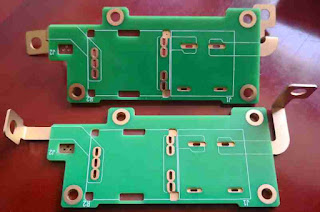Special PCBs: Enhancing Performance in Harsh Environments
Printed Circuit Boards (PCBs) are
the backbone of electronic devices, but not all PCBs are created equal.
Specialized PCBs, designed to operate in harsh environments, play a crucial
role in enhancing performance, reliability, and longevity in demanding
applications. In this article, we explore the innovative applications of
special PCBs and their impact on various industries operating in challenging
conditions.
Understanding Special PCBs
Special PCBs are engineered to
withstand extreme temperatures, moisture, vibration, corrosion, and other
environmental stresses that standard PCBs may not tolerate. These PCBs are
designed using specialized materials, coatings, and construction techniques to
ensure optimal performance and reliability in harsh environments.
Innovative
Applications in Harsh Environments
- Aerospace and Defense: Special PCBs are extensively used in aerospace and
defense applications where they must withstand high altitudes, temperature
variations, shock, and vibration. These PCBs are crucial for avionics,
radar systems, communication equipment, and missile guidance systems.
- Automotive Electronics: In the automotive industry, special PCBs are deployed
in vehicles to withstand extreme temperatures, humidity, and mechanical
stress. They are used in engine control units (ECUs), ABS systems, airbag
sensors, and infotainment systems, ensuring reliable performance under
rugged conditions.
- Industrial Automation: Industrial environments pose challenges such as dust,
moisture, temperature fluctuations, and electromagnetic interference
(EMI). Special PCBs with robust designs and protective coatings are used
in industrial automation systems, PLCs (Programmable Logic Controllers),
motor controls, and sensors for reliable operation in harsh industrial
settings.
- Oil and Gas Exploration: Oil and gas exploration activities often take place in
harsh environments such as offshore rigs, deserts, and Arctic regions.
Special PCBs designed for high-temperature resistance, chemical
resistance, and reliability are employed in drilling equipment, control
systems, and data acquisition units.
- Medical Devices:
Medical devices used in hospitals, clinics, and harsh medical environments
require PCBs that can withstand sterilization processes, moisture, and
electromagnetic interference. Special PCBs are integral to medical imaging
systems, patient monitoring devices, and life support equipment.
- Renewable Energy:
In the renewable energy sector, special PCBs are utilized in solar
inverters, wind turbines, and energy storage systems. These PCBs must
endure outdoor conditions, temperature variations, and exposure to UV
radiation while maintaining electrical performance and reliability.
Key
Features of Special PCBs
- High-Temperature Resistance: Special PCBs use materials such as ceramic substrates,
high-temperature laminates, and metal-core PCBs to withstand elevated
temperatures without compromising performance.
- Corrosion Resistance:
Coatings and finishes like ENIG (Electroless Nickel Immersion Gold), HASL
(Hot Air Solder Leveling), and immersion silver provide corrosion
resistance, ensuring long-term reliability in corrosive environments.
- Vibration and Shock Tolerance: Special PCBs employ reinforced structures,
shock-absorbing materials, and secure mounting techniques to withstand
mechanical stress and vibration without component failure.
- EMI/RFI Shielding:
Shielding techniques such as conductive coatings, ground planes, and
shielding layers protect sensitive components from electromagnetic
interference (EMI) and radiofrequency interference (RFI), maintaining
signal integrity.
- Environmental Sealing: Sealing techniques such as conformal coating, potting,
and encapsulation protect PCBs from moisture, dust, chemicals, and
contaminants, enhancing durability in harsh environments.
Conclusion
The
innovative applications of special PCBs play a vital role in enhancing
performance, reliability, and safety in industries operating in harsh
environments. From aerospace and defense to automotive, industrial automation,
medical devices, renewable energy, and beyond, special PCBs enable electronic
systems to function seamlessly under extreme conditions. As technology advances
and demands for ruggedized electronics grow, the importance of specialized PCBs in optimizing performance and longevity in
harsh environments will continue to rise.



Comments
Post a Comment